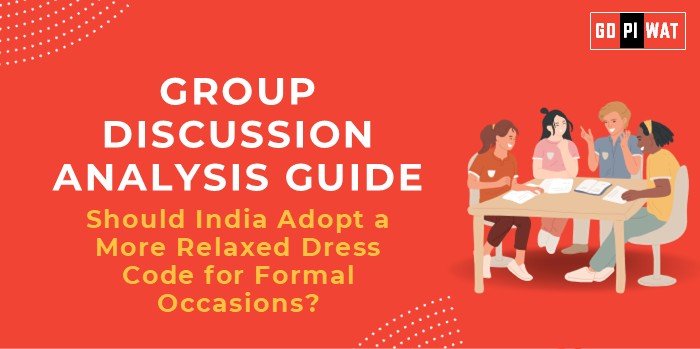📋 Group Discussion (GD) Analysis Guide: Should India Adopt a More Relaxed Dress Code for Formal Occasions?
🌐 Introduction to the Topic
- 💡 Opening Context: Dress codes have long been a reflection of societal norms and organizational culture. Recently, there has been growing discourse around balancing tradition with modern inclusivity and comfort, especially in formal settings.
- 📜 Topic Background: In India, formal dress codes often reflect cultural and professional expectations. However, debates over whether these codes should evolve have gained traction, driven by global workplace trends and changing social norms.
📊 Quick Facts and Key Statistics
- 👔 India’s Workforce: Over 500 million employees, increasingly influenced by global work cultures.
- 📈 Formal Dress Trends: 60% of urban professionals prefer “business casual” over traditional formals.
- 🌍 International Shifts: Countries like Sweden and the US widely embrace flexible dress codes, enhancing employee satisfaction.
- 🎭 Cultural Impact: Traditional attire like sarees or sherwanis still dominate formal occasions in weddings or festivals, symbolizing heritage.
👥 Stakeholders and Their Roles
- 🏛️ Government Institutions: Establish dress policies for public servants.
- 🏢 Corporate Organizations: Drive workplace norms, shaping perceptions of formality.
- 🎓 Educational Institutions: Influence young professionals with guidelines for professional events.
- 👥 Citizens: Their preferences and cultural values affect acceptance of relaxed norms.
- 🌐 International Corporations: Promote global trends in workplace and formal wear.
🏆 Achievements and Challenges
✨ Achievements
- 🧑💼 Increasing adoption of business casuals in corporate settings has improved comfort and productivity.
- 🎨 Events blending modern and traditional attire highlight cultural evolution without compromising heritage.
⚠️ Challenges
- 🛑 Resistance from traditionalists who view formal dress codes as a sign of discipline.
- 🌏 Difficulty balancing regional and global expectations.
🌍 Global Comparisons
- 🇸🇪 Success Story: Scandinavian countries show increased workplace satisfaction with casual dress codes.
- 🇯🇵 Challenges in Other Nations: Japan’s strict corporate attire has faced criticism for being outdated and uncomfortable.
💬 Structured Arguments for Discussion
- 💪 Supporting Stance: “Relaxed dress codes enhance creativity, inclusivity, and comfort without diminishing professionalism.”
- ⚖️ Opposing Stance: “Relaxation in dress codes may lead to a decline in perceived professionalism and respect for traditions.”
- 🤝 Balanced Perspective: “While relaxed codes improve comfort, guidelines must ensure cultural and professional standards are maintained.”
📚 Effective Discussion Approaches
- 💡 Opening Approaches:
- 📊 Begin with data on global workplace satisfaction linked to dress codes.
- 🌍 Reference a contrasting anecdote from Indian vs. global formal events.
- 🤔 Counter-Argument Handling:
- 💻 Use examples like the tech industry, where relaxed norms have not compromised output.
- 📊 Highlight surveys showing no correlation between dress formality and professional competence.
🔎 Strategic Analysis of Strengths and Weaknesses
- 💪 Strengths: Encourages innovation and inclusivity.
- 🛑 Weaknesses: May dilute traditional formality.
- 🌟 Opportunities: Aligning with global norms.
- ⚠️ Threats: Risk of cultural backlash.
🎓 Connecting with B-School Applications
- 📊 Real-World Applications: Corporate culture development, balancing inclusivity with professionalism.
- ❓ Sample Interview Questions:
- 💡 “How can dress codes influence workplace productivity?”
- 📄 “Do relaxed dress norms dilute cultural values?”
- 📝 Insights for B-School Students: Focus on adapting professional norms to context and inclusivity.


